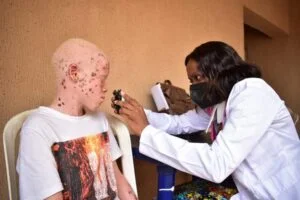The Vivigold Foundation for Albinism Empowerment, Education, and Healthcare, a non-governmental organization (NGO), has advocated for establishing and accessibility of specialized healthcare facilities with expertise in dermatology to address albinism-related skin conditions across the nation.
CEO of the foundation, Miss Vivian Ezeonwumelu said that individuals with albinism face a heightened risk of developing skin cancer compared to the general population.
Ezeonwumelu stressed the urgency of the matter by citing the alarming statistic that five members of the Anambra State Albinism Association succumbed to skin cancer within four years.
She said such deaths could be avoided if albinos had access to healthcare services and experts in albinism-related conditions for proper diagnosis, treatment, management and preventive care.
“It is essential to shed light on the challenges faced by the albinism community in Nigeria and the importance of addressing their plights and promoting inclusion.
“Skin cancer is a significant challenge for individuals with albinism in Nigeria. Due to the lack of melanin, their skin is extremely vulnerable to the damaging effects of Ultraviolet (UV) radiation.
“Most persons with albinism cannot afford the high cost of preventing skin cancer. Which is why we are calling on the governments, groups and well-meaning citizens to come to our rescue,” she said.
Ezeonwumelu said there was a need to establish specialised health facilities across the country to provide comprehensive support to address the specific health needs of the albinism community.
She said healthcare professionals should also receive specialised training on albinism-related skin conditions to improve early detection, diagnosis, and treatment of skin cancer.
According to her, such specialised hospital will be a safe space to help combat stigma, provide emotional support, and facilitate access to healthcare services.
ALSO READ: FG set to implement policies for adequate salt consumption
“The health facility will offer dermatological care and counselling to address the psychosocial impact of living with albinism, sun protection and skin cancer prevention, “she said.
Ezeonwumelu urged government agencies to collaborate with groups to intensify awareness about the risks of skin cancer in the albinism community as well as address the misconceptions and myths surrounding albinism.
According to her, this will create a more equitable and supportive environment and promote an inclusive society that respects the rights of individuals with albinism.
NAN


